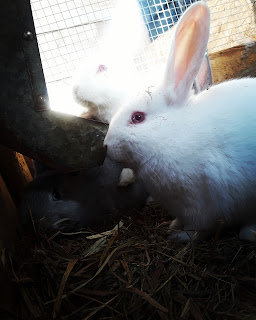Urban Livestock
 |
| Our New Zealand mixes |
The very first animal that we added were rabbits. Upon the suggestion of my great-aunt we purchased our first rabbits from a local farmers' market for their manure. As I began to investigate the slow food movement and factory farming I decided that I wanted to explore rabbits as a potential source of animal protein. With this decision our operation expanded slightly. Within the last year we have slowly cut back to two breeding pairs of rabbits.
So what are the pros and cons? Frankly speaking rabbits are an amazing addition to any small property homestead. For those of you who have chosen a vegan lifestyle they are extremely valuable as well. Their manure is gold for the garden. If properly cared for they are very clean animals that emit very little smell. They are so quiet that unless you put their living facility in clear view or tell someone about them most of your neighbors would not even know that they are there. If you do happen to eat meat they are a very healthy and lean meat. We try not to overtax our does and tend to only breed twice a year but it is not unheard of to breed up to four times a year. You can also make a little money off of breeding as well. You will not get rich but it does help pay for some of the feed cost if you sell some of your kits.
The cons are as follows. It is really easy to end up with too many rabbits, take my word for it! Not all does are good mothers. I am sure you are familiar with the old adage "they breed like rabbits" but some does are not good mothers. If you chose to keep your operation small this can be a problem. The next downfall goes without saying but it is really hard to kill an animal. There is a great responsibility in regards to this decision. So , if you plan on doing so yourself be prepared. Otherwise try to find someone who can responsibly do so.
Eventually we migrated toward backyard chickens. I grew up in a home that purchased nearly all their food from a grocery store. Though I had encountered chickens on the farms of family members I really had no idea what I was getting into. Initially I brought home four leghorns who were egg producing machines but extremely flighty and loud. After much research I became very interested in heritage breeds and brought home some lovely and rare Swedish flower hens. Nowadays we have five hens which produce plenty of eggs for our family of six.
 |
| Hand raised from a chick |
The benefit of chickens is that they really don't need a ton of space. If you get the right breed such as a barred rock for example they are reasonably quiet. They will cluck a bit when they lay an egg but nothing that should raise any complaints. Once again depending on the breed you will end up with a lot of fresh eggs, a leghorn can lay 300 a year! They are great pest control in the garden and once composted because it is a hot manure their droppings make fantastic fertilizer!
The biggest con I have encountered thus far is that during the rainy season they stink! When their manure gets wet it is a lot of work to keep the smell down and your neighbors unaware of any fowl odors. (See what I did there?) Another issue to consider is what you are going to do with your hens when they become older birds and do not lay regularly. Are you going to keep them and let them live out their days as a family pet? Will you sell them? Do they end up in the stew pot? Something to consider.
 |
| "Donald" the Rooster |
The most recent addition to our urban farm has been a pair of Nigerian dwarf/Pygmy goats.
Alright, so lets talk goats. Admittedly I am a bit of a rookie. I can tell you what I know though and what I am hoping to accomplish.
First off the rumor that goats will eat anything is untrue. These guys are not out there eating tin cans. They are very curious but they are picky eaters. Dry hay is important. Fresh water even more so and lots of it! Proper housing is a must, something we are still experimenting with.
They need to be medicated for parasites every few months. They need their hooves trimmed. They are not fun to castrate but then again who is? They are rascals.
 |
| Elvis our young buck |
With that said they are adorable, loving and calm animals that have the potential to produce delicious milk which can be taken straight or made into a number of useful items such as soap, yogurt and cheese. They catch is you have to have a consistent program if you are going to milk and a clean environment is a must!
So there you have it. Our experience with urban livestock. If I had it to do all over again I would probably stick with just a breeding pair of rabbits and a half dozen hens but I have no regrets in terms of branching out and going well beyond my comfort zone and my gardens look wonderful as a result (free fertilizer!)
P.S. I would like to thank my neighbors for being so cool about it!
You can also find the work of Tobias Whitaker at Mother Earth News, Grit Magazine and on Facebook. Be sure to see what he is up to on Instagram
All photographs by Tobias Whitaker unless noted.


Comments
Post a Comment